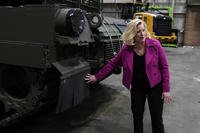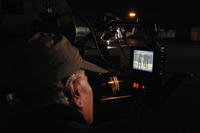The Pentagon’s advanced research agency is working on new cyber weapons designed to give commanders a tactical edge on future battlefields.
The head of the Defense Advanced Research Project Agency, known as DARPA, laid out the agencies “framework” for the future Wednesday in attempt to deal with the emerging threats and fiscal uncertainty on the horizon.
“We are building a future in which our warfighers can use cyber tools as tactical weapons that are fully integrated in the kinetic fight,” said Arati Prabhakar, director of DARPA.
While she didn’t offer a lot of details, Prabhakar also said DARPA is building a “new generation of electronic warfare that will leap frog what others around the world are doing with available technology.”
Another new initiative at DARPA involves building “a new suite of technologies for position, navigation and timing so that our people and our platforms won’t continue to be dangerously reliant on GPS,” Prabhakar said.
Cyber security has become a great concern among defense officials and lawmakers. A well-executed cyber attack can paralyze a country’s economy as well as communications and other key infrastructures.
As effective as cyber can be, it’s also unreliable and difficult to control, Prabhakar said. DARPA scientists are working on “Plan X,” an effort to build the technology infrastructure “that would allow cyber to move from the world we are in today where it is a fine hand-crafted capability that requires exclusive authorities to do anything with, that when you launch it into the world you hope that it is going to do what you think it is going to do, but you really don’t know.”
The goal is to “to move to a future where cyber is a capability like other weapons capabilities,” Prabhakar said. “A military operator can design and deploy a cyber effect, know what it is going to accomplish, do battle damage assessment and measure what it has accomplished.”
Prabhakar gave no time estimate for when the concept could become reality, but seemed optimistic.
“There is a lot of hard technology to build from here to there, but I think it is going to be a huge game changer,” she said.








